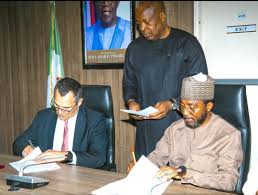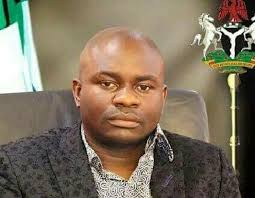News
NHIS’ Exec Sec In Fresh N25bn Fraud Scandal

Less than four months after his controversial reinstatement, the Executive Secretary of the National Health Insurance Scheme, Usman Yusuf is again in trouble over a N25 billion investment scam.
The newly inaugurated Governing Council of the agency has accused Mr Yusuf of misleading it to act against the policy directive of government by fraudulently obtaining its approval to invest the sum in securities.
The council also said the Executive Secretary concluded the arrangement for the investment before seeking its approval, contrary to the laws governing the scheme, and ignored key conditions it attached to the approval.
Mr. Yusuf was suspended by the Minister of Health, Isaac Adewole, in July 2017, following allegations of gross misconduct.
The minister then set up a panel to investigate the allegations. The panel reportedly indicted the Executive Secretary, following which the minister forwarded the report to the presidency.
But in February, without informing the minister, President Muhammadu Buhari reinstated Mr Yusuf into his office.
The development ignited an uproar, with a group of workers staging a protest at the agency against the return of the executive secretary.
President Buhari later summoned the minister and Mr Yusuf to a meeting at which he urged them to bury the hatchet and work together in the interest of the scheme.
Earlier in December, the president appointed a governing board for the scheme, alongside those of 208 other federal parastatals.
In February, he directed ministers to inaugurate the boards of agencies under their supervision. That directive was carried out on March 6 at the NHIS when the governing board was inaugurated with Enyantu Ifenne, a medical doctor, as chairperson.
However, much earlier in August while Mr Yusuf was still on suspension, the minister gave approval to the acting Executive Secretary of the scheme, Attahiru Ibrahim, to invest “idle funds” of the agency in federal government securities.
This was said to be in line with the National Health Insurance Act (Part IV, Section 11.4), which states that:
“The Scheme shall invest any money not immediately required by it in Federal Government Securities or in such other securities as the Council may, with the approval of the Minister, from time to time, determine.”
According to the letter of approval (HMH/ABJ/032/X/465), dated August 18, 2017, the minister wrote:
“It has come to my notice that the NHIS kept residual balance not immediately required for day-to-day operations idle in Treasury Single Account with the CBN. The Sum has accumulated over the years and has become somewhat sterilised as you continue to hold it in cash thereby leading to erosion in value due to inflationary trends which currently stands at 16.1%
“Following from above and in order to arrest this value erosion of the NHIS funds, I hereby approve as follows:
Commence effective immediately, starting with the sum of N10 Billion Naira (sic) up to the tune of N50 Billion Naira (sic) investments in Federal Government Securities at prevailing market determined yields.
Engage the services of any of the regulatory bodies certified investment counter parties; Cowry Asset Management Limited, Finmal Securities Limited or Elixir Investment Partners Limited to advise on the investment options and seamlessly execute same.
The investment actions and the expected returns should be captured in your 2017 budget estimates.
“It is my expectation that the returns on these investments will be used to fund part or all of the proposed interventions in the tertiary health institutions without depleting NHIS actual funds balances. I have taken the liberty to notify the Honourable Minister of Finance, Chairman Senate Committee on Health and Chairman House Committee on Health Services.”
However, 11 days later, the minister wrote again to the acting Executive Secretary to reverse his approval.
In the letter (HMH/ABJ/312/11/82) dated August 29, 2017, Mr Adewole wrote:
“This is to inform you that the Honourable Minister of Finance has advised against the proposal to invest NHIS residual funds in securities. The approval of such investment, she stated, will be an indirect violation of the Government’s Treasury Single Accounts (TSA) policy.
“In view of the above, the Central Bank of Nigeria (CBN) has been advised to pay Treasury Bill rates on any residual balance held in the TSA with CBN for Investment Trusts.
“You are therefore directed to stop all actions and processes on the investment of NHIS residual funds in securities with immediate effect and approach CBN to facilitate the payment of interest on residual funds.”
The later letter appeared to have put closure on the idea to invest the NHIS “idle funds”, until Mr Yusuf regained his office in February.
Documents revealed that shortly after his reinstatement, he engaged one of the certified investment firms, Cowry Asset Management Limited, as financial adviser and directed it to proceed with the investment, relying on the original letter of the minister conveying approval but ignoring the other letter withdrawing the approval.
He directed that N25 billion be invested in five tranches of five billion Naira each and to mature in 2034.
According to insiders at the NHIS, this was also in defiance of advice of officers at the agency, some of whom later decided to frustrate the process pending the inauguration of the governing board.
Following the inauguration of the Council on March 6, Mr Yusuf presented a memo to its first sitting on April 25, on the “urgent need to invest NHIS funds due to huge deficit spending, inflation, poor cash backing, debts owed the Scheme by banks and unauthorized deductions by the Office of the Accountant General of the Federation.”
He asked the council to approve that the NHIS management immediately commence the process of investing the residual funds in federal government securities and give progress report of the investment to council from time to time.
Based on the memo, the council approved the placement of N30 billion only in federal government securities “with no commission payment to a third party.”
Following the council’s resolution, Mr Yusuf on May 3 wrote Cowry Asset Management Limited to inform it that the council stated clearly that “there should be no payment of any commission to a third party” for the investment.
He, however, stated: “The Scheme will therefore engage Cowry Asset Management Ltd in a similar way it did its Forensic Auditors and retained Lawyer with initial engagement fee and any subsequent payments of fees presented for work done by your Company will be subject to the approval of the Tenders Board.”
After the approval, aghast insiders at NHIS made the council aware of the advice of the minister against the investment when the idea was initially muted in 2017.
Irked that the executive secretary had only presented to it the initial letter of the minister conveying his approval, it directed that no further action be taken on the investment.
The council also issued Mr Yusuf a query for misleading it to give approval for a course of action that is against the policy directive of government.
According to the query issued by the Chairman of the Governing Council, Mrs Ifenne, the council noted that its provisional approval was for “Management to initiate due process and submit a proposal to enable Council seek authorisation by the Honourable Minister of Health.”
Mrs Ifenne’s letter continued: “As it stands, Council attention has been drawn to new information which you failed to disclose in your earlier presentation.”
The council said Mr Yusuf withheld from it a letter from the minister which expressly stated that the Minister of Finance advised against investing NHIS funds in securities.
It also accused the executive secretary of engaging the financial adviser without stating the terms and conditions of engagement.
Other charges are that Mr Yusuf approved “wholesale” the proposal of the firm he engaged as financial adviser on the eve of the inauguration of the council, and directed a general manager of the scheme to expedite disbursement of N25 billion for long-term investment without obtaining prior approval of the Minister of Health as required under the NHIS Act.
He was also accused of engaging the investment advise on “vague and elastic terms”, and instructing an official to process the firm’s engagement without further reference to council for approval.
Stressing the council was not presented with all available information to enable informed decision-making on the matter, the chairman stated that the council believed that “non-disclosure of significant information misled it into error in decision which may compromise her standing.”
The query advised Mr Yusuf to explain in writing “the observed procedural lapses and failure to disclose critical information to Council.”
It directed him to present his explanation to council at its meeting scheduled for June 12.
That meeting, however, did not hold on that date due to other reasons and the council is yet to announce another date for the meeting.
Mr Yusuf did not respond to efforts by our correspondent to get his reaction on the matter as he refused to pick several calls or respond to a text message requesting his response.
News
FG Targets Production Of Locally Made Vehicles By Dec
The Minister of Industry, Trade and Investment, Dr Doris Uzoka-Anite, has affirmed that Nigeria now has the capacity and materials to manufacture Made-In-Nigeria cars for local use and export.
With the enabling environment being provided by the government, she said manufacturers should be held responsible if the cars are not rolling out by December 2024.
Currently, Nigeria produces less than 10 per cent of the vehicles used in the country.
Last year, Nigeria’s vehicle assembling industry, estimated to be worth around N302billion, tanked to a new low due to increasing production costs and weakened demand for locally assembled automobiles.
According to the Manufacturers CEOs Confidence Index, activities of motor vehicles and miscellaneous assembly deteriorated further below the benchmark (50 points) from 48.6 to 46.7 points.
But speaking at the Automotive Component Manufacturers meeting in Abuja, she noted that the automobile industry is faced with both challenges and opportunities.
A statement issued last Friday by the Director of Information and Public Relations, Adebayo Thomas, said, “In a significant move aimed at fostering sustainable growth and development in Nigeria’s automobile industry, the Federal Government has issued a clarion call to all stakeholders, including manufacturers, dealers, regulatory bodies, and other players in the automobile ecosystem.
“The call comes as part of a broader strategy to enhance the sector’s contribution to the nation’s economy.”
Encouraging the stakeholders to key into the Nigerian Automotive Development Policy, the Minister said, “As far as we are concerned, the auto industry is now set to go.
“We are counting on all stakeholders to make that happen. If we do not produce made-in-Nigeria cars before the end of this year (December), it will be your fault, because I am sitting down here giving you all the assurances that this administration has created the enabling environment to make sure that the auto policy kicks off.”
Anite emphasised the need for collaboration among manufacturers, dealers, regulatory bodies, and other players in the automobile ecosystem, saying by working together, they can address challenges, streamline processes, and drive innovation.
She also urged stakeholders to maintain high-quality standards across the board, including vehicle manufacturing, safety features, emissions control, and after-sales services.
Stringent adherence to quality, she said, will boost consumer confidence and attract investment.
The minister assured all that the government would continue to encourage increased investment in research and development, adding that, innovations in electric vehicles, fuel efficiency, and alternative energy sources are critical for long-term sustainability.
On local content, she also emphasised the importance of promoting local content by sourcing materials and components locally.
By doing this, she said, the sector can create jobs, reduce import dependency, and contribute to economic diversification
In his introductory comments, the ministry’s Permanent Secretary, Nura Rimi, emphasised the significance of team action and shared vision as outlined in the Nigerian Automotive Development Policy.
He also urged stakeholders that the country “will overcome obstacles and unleash the full potential of Nigeria’s automotive component sector.”
He encouraged NADDC and other stakeholders to use the chance to form alliances, explore new areas of collaboration, and devise ways to catapult the automotive components manufacturing industry to new heights of success.
The statement added, “The government’s charge underscores the pivotal role stakeholders play in shaping its trajectory. Their commitment to sustainable practices will drive Nigeria’s automotive sector towards a brighter and more prosperous future.
“Environmental Responsibility: Stakeholders are reminded of their environmental responsibilities. Sustainable practices, recycling, and eco-friendly manufacturing processes are essential for a greener future.”
News
Waive Tax On Electronic Imports, Women Engineers Appeal To Tinubu
The Association of Professional Women Engineers of Nigeria (APWEN), Lagos Chapter, has called on President Bola Tinubu to exempt the importation of electronic components from taxation for inventive engineers.
Chairman of APWEN, Ms Atinuke Owolabi, said this a in statement yesterday in Lagos, in commenration of the 2024 World Creativity and Innovation Day, with the theme: “Step Out and Innovate”.
The Tide source reports that World Creativity and Innovation Day is a global UN Day, celebrated on April 21, to raise awareness about the importance of creativity and innovation in problem solving.
This is with respect to advancing the United Nations’ sustainable development goals, also known as the global goal.
Owolabi explained that such a measure would significantly enhance technological progress, support local innovators, and elevate Nigeria as a leading hub for innovation globally.
She stated that in a world marked by dynamic challenges and unprecedented opportunities, creativity and innovation stand as the driving forces behind progress and transformation.
According to her, women engineers recognise the critical role that innovation plays in shaping our societies and driving sustainable development.
”On this occasion, we affirm our commitment to fostering a culture of creativity and innovation within our organisation and the broader engineering community.
”Together, let us step out, innovate, and inspire the next generation of women engineers to reach even greater heights of achievement and impact.
”We believe that by stepping out of our comfort zones and embracing new ideas, technologies, and approaches, we can unlock innovative solutions to the complex challenges facing our world today,” she said.
According to her, the theme: ‘step out and innovate’, serves as a call to action for women engineers everywhere to break barriers, challenge conventions.
She noted that it would also pioneer groundbreaking solutions that would propel them toward a brighter and more sustainable future.
Owolabi disclosed that in celebration of the World Creativity Day, APWEN Lagos had inaugurated an artificial intelligence club tailored for female engineering students and young engineers.
She said that the proactive initiative aimed to inspire and equip young engineers with cutting-edge technological insights.
Th chairman said, “Additionally, we already have a 200-capacity hall to set up a resource, technology, and innovation hub to empower women and girls in engineering.
”This endeavour serves as a catalyst for encouraging aspiring female engineers to embrace innovation and stay abreast of emerging trends in the field.
”APWEN Lagos stands united in its dedication to promoting diversity, inclusivity, and excellence in engineering.
“We encourage all female engineers to seize this opportunity to unleash their creativity, explore new frontiers, and make an indelible mark on the world.”
News
Pan-Igbo Group Hails Dangote Group For Reducing Diesel Price
A pan-Igbo group, Ndigbo Unity Forum (NUF), has commended the Chairman of the Dangote Group, Alhaji Aliko Dangote, and his management for reducing the price of diesel from N1,600 to N,1000 per litre.
The Tide’s source reports that diesel is the major fuel used by heavy duty vehicles and generating sets to transport goods as well as run industries across the country.
The President of NUF, Mr Augustine Chukwudum, told The Tide’s source in Enugu, yesterday, that Dangote’s timely response to suffering masses of Nigerians, going through hell to get a meal a day, “is highly commendable”.
According to Chukwudum, Nigerians need to appreciate the patriotism of Dangote since what he has done will go a long way in reducing prices of goods, especially food stuff which has gone out of the reach of the poor.
He called on Nigerians, who wish and pray always for the betterment of the country, to appreciate and thank God for answering their prayer through Dangote’s move.
“It is clear that if Dangote Refinery starts fully and gets all the crude oil needed from Nigeria, the prices of petrol, kerosene and diesel will further reduce.
“We commend President Bola Tinubu for being a listening President and supporting the Dangote Group on our crude oil needs.
“We appeal to Tinubu to encourage Dangote by providing the company with crude oil at a reduced rate as we have been demanding,” he said.
Chukwudum said that this move and subsequent further reduction, would bring industries in comatose back to life, jobs created for unemployed youths and reduction in crime as well.
“We call on governors of oil-producing Anambra, Imo and Abia States to bring investors, who shall build refineries in each of the states to refine thousands of barrels of crude in commercial quantities,” he said.
-

 Maritime4 days ago
Maritime4 days agoNPA Secures $700m Citibank Loan For Tin Can, Apapa Ports Rehabilitation
-

 News3 days ago
News3 days agoJAMB Sanctions Officials For Asking Candidate To Remove Hijab
-

 Opinion4 days ago
Opinion4 days agoCautious Optimism As Naira Rebounds
-
News3 days ago
Waive Tax On Electronic Imports, Women Engineers Appeal To Tinubu
-

 Sports4 days ago
Sports4 days agoCRSG Doubles Subvention For Rovers FC
-

 Maritime4 days ago
Maritime4 days agoWestern Marine Command Customs Gets New Boss
-

 News3 days ago
News3 days agoNDLEA Arrests Three Wanted Kingpins, Seizes 51.90kg Heroin
-

 Politics4 days ago
Politics4 days agoNEC Meeting: PDP’ll Wax Stronger – Farah Dagogo

